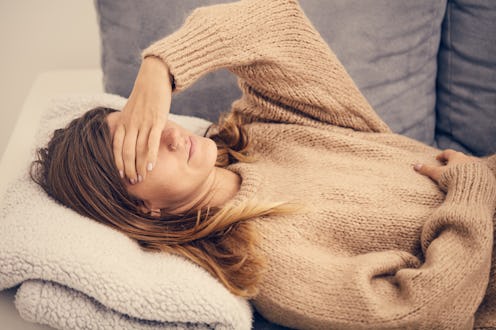Life
“Nonessential Items” Can Be Good For Your Mental Health — So Why Do We Still Shame Them?

In 2018, I had four jobs, and there were times I was working seven days a week. Because of this, I got a lot of things delivered. I mean, who has time to go to the store or prepare three meals a day when you're working nonstop? However, according to a recent viral survey that suggested that the average person in the U.S. spends $18,000 a year on "nonessentials," I indulge in a lot of nonessential things on the regular. Essential is defined as something that's absolutely necessary. This includes food, water, and shelter. So did I really need all of those deliveries? Yeah, I kinda did.
Not surprisingly, the survey resulted in some strong feelings from people like me who are tired of being shamed for buying a latte. Eliminating things from your life that make you happy can be bad for your psychical and mental health, and some of the items on this "nonessential" list provide people with much-needed joy and mental stability. Stress and burnout are real problems that can cause significant psychological and physical distress, and it's not nonessential to seek respite from this by taking care of yourself.
Many people believe that those who can't afford basics shouldn't have any "luxuries," (though these same people likely consider these items essential). Realistically, occasionally treating yourself to a bottle of wine or a workout class is not irresponsible. It's survival.
In fact, a study published in the Journal of Consumer Psychology found that some material goods that could be considered nonessential are actually pretty important for health and happiness. "A musical instrument, for example, makes possible a sort of human happiness hat trick: Finely tune your skills, get the happiness of mastery (competence); play your heart out, get the happiness of self-expression (autonomy); jam with friends, get the happiness of connecting with others (relatedness)," Rebecca J. Rosen reported for The Atlantic.
Are musical instruments necessary for survival? No. Can they increase quality of life? Yes. The OnePoll survey questions whether or not people could afford more essential items — like paying off debt or saving money for the future — if they spent less on so-called nonessentials. Perhaps this is true in cases of extreme overindulgence. However, the $30 a month I would save if I ditched my music and TV streaming services isn't going to help me pay down my astronomical student loan debt.
When determining what is essential and what isn't, the party line as of late has been all about minimalism. However, another study published in the journal Psychological Science found that some items considered nonessential can actually make people pretty happy, and what's essential and what's not is indeed highly subjective.
"We found that individuals spend more on products that match their personality, and that people whose purchases better match their personality report higher levels of life satisfaction," the study reported. "A follow-up study showed a causal effect: Personality-matched spending increased positive affect."
Another study published in the journal Psychological Inquiry concluded that subjective wellbeing is important in determining quality of life "because it allows individuals rather than experts to decide what is important to them." This means that something that's essential to one person might not be essential to another person. The bottom line is that you get to define what is essential for you to be healthy and happy.
Other items certain celebs would call "nonessential" include food and sleep. Talk show host Steve Harvey recently came under fire for saying that "rich people don't sleep eight hours a day," which is categorically not true. Not only is it not based in fact — socioeconomic levels are directly linked to greater amounts of sleep and higher sleep quality — making a claim like this suggests that not sleeping is a way to become wealthy. And that can be dangerous.
There are countless scientific studies concluding that lack of sleep is detrimental to both physical and mental health. I don't know about you, but after a few days of not enough sleep I revert to a toddler. I'm cranky, I cry at the drop of a hat, and I can't focus on anything. This can translate into lost productivity, which can have a direct impact on earning ability.
Another example of this phenomenon is Twitter CEO Jack Dorsey's comments that he doesn't eat on the weekends. "Now people are like, 'Hey, if this guy’s doing it, maybe there’s something to it,'" Brian Richards, whose company SaunaSpace has benefited from Dorsey touting the benefits of infrared saunas, told Nellie Bowles for The New York Times. Food is, of course, an essential for living; eating or not eating isn't a moral choice, and unhealthy food restriction won't make "time slow down," as Dorsey claimed in a tweet.
Frankly, all of these messages about essential items being called nonessential (delivery, food, sleep, self-care, coffee) are designed to make people feel ashamed of taking care of themselves. Life is long, and sometimes it's a real drag. You do you. If you choose to treat yourself to drinks with friends or a gym membership, there is absolutely zero shame in your game.
If you or someone you know is seeking help for mental health concerns, visit the National Alliance on Mental Health (NAMI) website, or call 1-800-950-NAMI(6264). For confidential treatment referrals, visit the Substance Abuse and Mental Health Services Administration (SAMHSA) website, or call the National Helpline at 1-800-662-HELP(4357). In an emergency, contact the National Suicide Prevention Lifeline at 1-800-273-TALK(8255) or call 911.